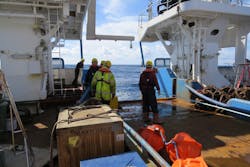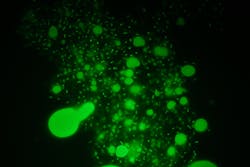Research team monitors oil-eating bacteria in northeast Atlantic
Offshore staff
EDINBURGH, UK – An underwater observatory in the Faroe-Shetland Channel offshore northwest Scotland has detected oil-eating bacteria that could help manage future oil spills.
The observatory, said to be the first of its kind in the northeast Atlantic, is in an area with a heavy oil and gas and shipping activity. The Royal Society, the Society for Applied Microbiology, and the Marine Alliance for Science and Technology for Scotland are helping to fund the research.
According to Dr Tony Gutierrez of Heriot-Watt University, it is unclear whether the oil-degrading bacteria provide evidence of chronic spillage, but it is a hopeful sign should blowouts or pollution arise in the area.
“Oil-degrading bacteria play a vital role in cleaning up oil spills – we found them strongly enriched during the Deepwater Horizon spill, for example. These types of microbes thrive on oil as a food source.”
Gutierrez and his team monitored the Faroe-Shetland channel’s water over a two-year period, at different depths and locations.
“Overall, we detected a higher than usual abundance of these bacteria. They comprised about 15-20% of the total community of microbes, when quite often you find them at less than 1% abundance.
“We’re not sure why this is the case – it could be due to natural seepage of oil from the seafloor, or the release of produced waters from oil rigs.”
Establishing a baseline in these waters, he added, will support monitoring of the impact of future spills and the success of any future clean-up campaigns.
The team now plans to extend its monitoring in the Faroe-Shetland channel, and have identified other locations for similar observatories.
“Creating microbial observatories in other ocean regions at potential risk of pollution and climate change effects, like the Arctic, is one of our goals,” said Gutierrez.
03/29/2021

